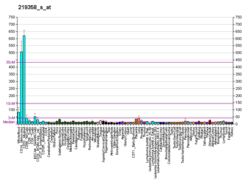Arf-GAP with dual PH domain-containing protein 2 is a protein that in humans is encoded by the ADAP2 gene.
References
- ^ GRCh38: Ensembl release 89: ENSG00000184060 – Ensembl, May 2017
- ^ GRCm38: Ensembl release 89: ENSMUSG00000020709 – Ensembl, May 2017
- "Human PubMed Reference:". National Center for Biotechnology Information, U.S. National Library of Medicine.
- "Mouse PubMed Reference:". National Center for Biotechnology Information, U.S. National Library of Medicine.
- "ADAP2 ArfGAP with dual PH domains 2 [ Homo sapiens (human) ]".
External links
- Human ADAP2 genome location and ADAP2 gene details page in the UCSC Genome Browser.
Further reading
- Maruyama K, Sugano S (1994). "Oligo-capping: a simple method to replace the cap structure of eukaryotic mRNAs with oligoribonucleotides". Gene. 138 (1–2): 171–4. doi:10.1016/0378-1119(94)90802-8. PMID 8125298.
- Suzuki Y, Yoshitomo-Nakagawa K, Maruyama K, et al. (1997). "Construction and characterization of a full length-enriched and a 5'-end-enriched cDNA library". Gene. 200 (1–2): 149–56. doi:10.1016/S0378-1119(97)00411-3. PMID 9373149.
- Jenne DE, Tinschert S, Stegmann E, et al. (2000). "A common set of at least 11 functional genes is lost in the majority of NF1 patients with gross deletions". Genomics. 66 (1): 93–7. doi:10.1006/geno.2000.6179. PMID 10843809.
- Whitley P, Gibbard AM, Koumanov F, et al. (2003). "Identification of centaurin-alpha2: a phosphatidylinositide-binding protein present in fat, heart and skeletal muscle". Eur. J. Cell Biol. 81 (4): 222–30. doi:10.1078/0171-9335-00242. PMID 12018390.
- Strausberg RL, Feingold EA, Grouse LH, et al. (2003). "Generation and initial analysis of more than 15,000 full-length human and mouse cDNA sequences". Proc. Natl. Acad. Sci. U.S.A. 99 (26): 16899–903. Bibcode:2002PNAS...9916899M. doi:10.1073/pnas.242603899. PMC 139241. PMID 12477932.
- Hanck T, Stricker R, Sedehizade F, Reiser G (2004). "Identification of gene structure and subcellular localization of human centaurin alpha 2, and p42IP4, a family of two highly homologous, Ins 1,3,4,5-P4-/PtdIns 3,4,5-P3-binding, adapter proteins". J. Neurochem. 88 (2): 326–36. doi:10.1046/j.1471-4159.2003.02143.x. PMID 14690521. S2CID 19363530.
- Gerhard DS, Wagner L, Feingold EA, et al. (2004). "The Status, Quality, and Expansion of the NIH Full-Length cDNA Project: The Mammalian Gene Collection (MGC)". Genome Res. 14 (10B): 2121–7. doi:10.1101/gr.2596504. PMC 528928. PMID 15489334.
- Venturin M, Bentivegna A, Moroni R, et al. (2005). "Evidence by expression analysis of candidate genes for congenital heart defects in the NF1 microdeletion interval". Ann. Hum. Genet. 69 (Pt 5): 508–16. doi:10.1111/j.1529-8817.2005.00203.x. PMID 16138909. S2CID 45891228.
- Douglas J, Cilliers D, Coleman K, et al. (2007). "Mutations in RNF135, a gene within the NF1 microdeletion region, cause phenotypic abnormalities including overgrowth". Nat. Genet. 39 (8): 963–5. doi:10.1038/ng2083. PMID 17632510. S2CID 35797973.
This article on a gene on human chromosome 17 is a stub. You can help Misplaced Pages by expanding it. |




